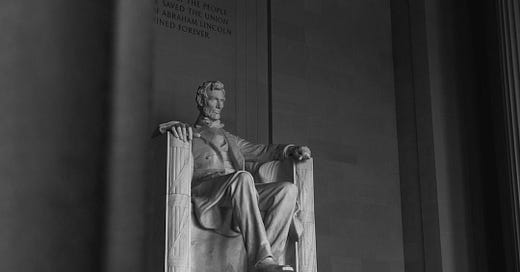It’s been a while since I’ve posted. I’ve been busy finishing my article on how Abraham Lincoln’s law practice influenced his presidency. I’ve spent countless hours over the past year reading everything I could on his law practice. In early September, I went to a day-long seminar on this subject presented by the Illinois State Bar Association at the Lincoln Museum in Springfield. Suffice it to say, I’ve learned quite a bit about Lincoln and the law and want to share a few thoughts.
The first thing that struck me during my research was how much Mr. Lincoln genuinely loved the practice of law. This is refreshing considering the number of lawyers who whine and lament about choosing it as their profession. And yes, like us, he had challenging clients, difficult judges, and aggressive opponents. He learned how to manage and overcome these obstacles and maintain both dignity and excellence in the practice.
Until shortly before he left for the White House, Lincoln practiced law, riding the circuit for half the year. His circuit riding involved going county to county in central Illinois with a band of itinerant lawyers and one judge who presided. They tried cases on the fly, without much time to prepare. And by all accounts, Lincoln excelled in this improvisational environment. This habitat was Lincoln’s training ground for all the tumult of his presidency.
The lifestyle on the circuit was terrible: Lincoln and his band of brothers stayed at various inns throughout central Illinois. The food was crappy and the accommodations even worse. Lincoln often shared an uncomfortable bed with 300 lb. Judge David Davis, who later became Lincoln's campaign manager. His last partner, William Herndon, related that despite the hardship, Mr. Lincoln loved the peripatetic lifestyle even though he made less money. In 1852, he was offered a lucrative partnership in Chicago and turned it down, telling Herndon that it would kill him to be cooped up in an office all day.
I also learned that Lincoln had a substantial divorce practice. While his bread-and-butter work was debtor/creditor law and livestock and property disputes, his firms handled most of the divorce cases in central Illinois. While I thought the divorce practice was a product of the 20th century, divorce was prevalent during Lincoln’s time. Illinois had liberal divorce laws in the mid-19th century, and the courts protected women’s rights to support and custody. Lincoln scholars have described the 19th-century Illinois legal culture as paternalistic toward women. Lincoln himself was known to be as well. While today we might think of paternalism as patronizing, in those times, it was admirable and near revolutionary.
Lincoln’s skill was in the courtroom—both trial and appellate courts. While all lawyers of that era were generalists, he practiced almost exclusively in the courtroom. This probably comes as no surprise considering how popular culture reflected his law practice. But what was surprising was how truly adept he was at it. His peers were universally laudatory of him and his talents. His strengths included working tirelessly, fighting fairly, never misrepresenting the law or facts (rather, he used them to his advantage), reading the room, and crafting the message with his audience in mind. Timeless principles of advocacy, to be sure.
As he evolved in the practice, his reputation as an extraordinary litigator extended far and wide, and toward the end of his career, he moved from fighting over hogs to litigating issues of large commercial interests. But despite his renown, he never gave up the smaller bread and butter cases.
It was interesting to see him use many of the same traits he used as a working lawyer while president. His flexibility, diligence, and creativity certainly derived from his days on the circuit.
My research not only educated me, but it also stirred me. My year with Lincoln revealed that despite the grit and the grime of the practice, life lessons are abundant. Lincoln applied those lessons to save our country. To me, he remains relevant as an inspiration and role model for all lawyers looking for meaning in the practice. Let me close with a snippet from my article to be published next spring in the Journal of the American Academy of Matrimonial Lawyers:
It's perhaps comforting to know that, despite the frequent indignities and difficulties inherent in the practice of law, Abraham Lincoln's life and career provide meaning today. After all, he experienced many of the same difficulties and challenges that modern lawyers face. And he learned from them; despite the difficulties of practicing law, he applied those lessons to achieve great things for our country. Michael Burlingame beautifully sums up why Lincoln matters:
Few people will achieve his world historical importance, but many can profit from his personal example, encouraged by the knowledge that despite a childhood of emotional malnutrition and grinding poverty, despite a lack of formal education, despite a series of career failures, despite a miserable marriage, despite a tendency to depression, despite a painful midlife crisis, despite the early death of his mother and his siblings as well of his sweetheart and two of his four children, he became a model of psychological maturity, moral clarity, and unimpeachable integrity. His presence and his leadership inspired his contemporaries; his life story can do the same for generations to come.1
And at least as I see it, much of that inspiration was conceived in the courthouses on the Illinois prairie.
Burlingame, Abraham Lincoln Traveled this Way: The America Lincoln knew 259.




Inspiring and excellent. I can't wait to read the article!